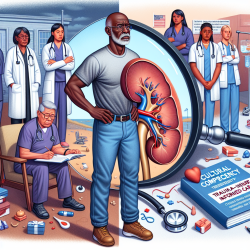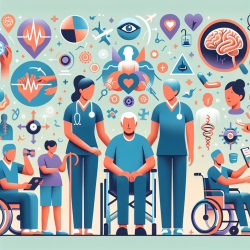The research article "Perspectives on Racism in Health Care Among Black Veterans With Chronic Kidney Disease" provides a poignant look into the experiences of Black veterans navigating a complex health care system. This study highlights the emotional and physical stress these individuals endure due to racism, and it offers valuable insights for practitioners looking to improve their skills and provide more equitable care.
The Impact of Racism on Health
The study involved 36 Black veterans with chronic kidney disease (CKD) who shared their encounters with racism in a health care setting. These interactions often resulted in feelings of anger, resentment, and stress. Many veterans expressed a strong distrust in the health care system, feeling the need to be hypervigilant during clinical encounters. This distrust can lead to maladaptive behaviors such as substance use or avoidance of medical care altogether.
The findings underscore the significant impact of racism on both mental and physical health. For instance, participants reported psychological symptoms like anger and physiological symptoms such as headaches and high blood pressure. The stress associated with racism was seen as exacerbating their CKD symptoms.
Implementing Trauma-Informed Care
The study suggests that trauma-informed care could be an effective approach for addressing race-based stress and trauma among Black veterans. Trauma-informed care involves understanding, recognizing, and responding to the effects of all types of trauma. It emphasizes physical, psychological, and emotional safety for both patients and providers and helps survivors rebuild a sense of control and empowerment.
For practitioners, adopting trauma-informed care means acknowledging the intersection of trauma and racism. It involves creating safe, inclusive environments where patients feel heard and respected. Practitioners should be trained to recognize signs of trauma and understand how it might manifest in clinical settings.
Cultural Competency as a Tool for Change
Cultural competency is another critical component in improving health outcomes for marginalized populations. It requires practitioners to understand the social determinants of health that affect their patients' lives. By developing cultural humility—recognizing one's limitations in understanding another's culture—practitioners can foster better communication and trust with their patients.
This approach encourages continuous learning and adaptation, ensuring that health care providers remain sensitive to the diverse needs of their patients. It also involves actively seeking feedback from patients about their experiences with racism in health care settings.
A Call to Action for Practitioners
The insights from this study highlight the need for ongoing education and training in trauma-informed care and cultural competency for all health care professionals. By implementing these approaches, practitioners can help mitigate the adverse effects of racism on health outcomes.










